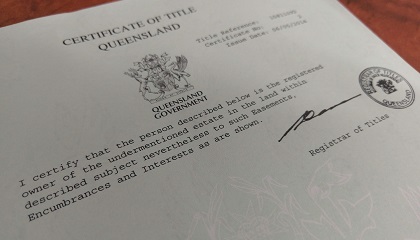
A ‘Certificate of Title’ has traditionally been used to prove ownership to a property. The Titles Office has just announced that from 1 October 2019, Certificates of Title will be abolished. Why?
The simple answer is that the Titles Registry in Queensland is computerised (and has been since 1994). All dealings are submitted to the Registry, processed, and the title updated on computer records. Historically, a hard copy Certificate of Title would show all dealings involving a particular piece of land, and would be the definitive source of ownership.
Since 1994, Certificates of Title have still been available as an option for property owners to obtain. They are not as elegant as the older Certificates of Title as they are a print out of the current computer title on special paper. They are rather different to the hand written Certificates of Title from the past.
Most property owners are content not to request a Certificate of Title. Only about 11% of properties in Queensland have one. Those who request one usually request it as evidence of ownership in the case of the Titles Registry’s electronic records being compromised (which hasn’t occurred yet).
From 1 October 2019, a Certificate of Title (if issued) will no longer have any legal significance. While they do not need to be destroyed, they do not have to be provided to the Titles Office to effect a dealing over a property either. They will essentially hold sentimental value only.
Having a Certificate of Title can cause serious problems if they are misplaced. Currently there is a rigorous process to be followed, including public notification, if a property owner wishes to dispense with the production of the Certificate of Title at the Titles Registry. This can cause havoc during the conveyancing process because of the delays involved in complying with the Titles Registry’s requirements. From 1 October 2019 this will no longer be an issue.
This also means that from 1 October 2019, a property owner will no longer be able to request a Certificate of Title.
Our experienced lawyers handle all kinds of property and conveyancing matters. Please contact us if we can be of assistance to you.
This post is general information only. It is not a substitute for legal advice from a lawyer. If you have a legal issue, you should always contact your lawyer to obtain advice that is relevant to your circumstances.

